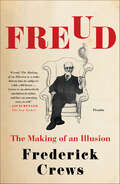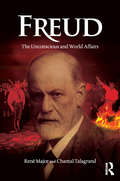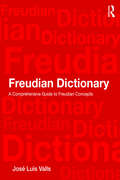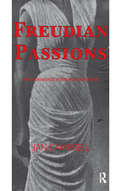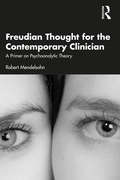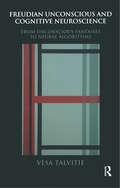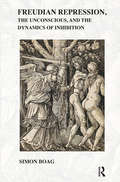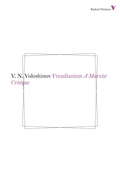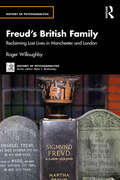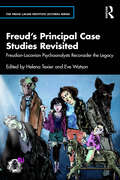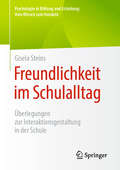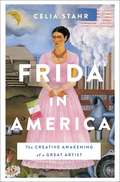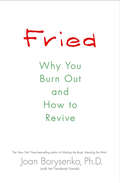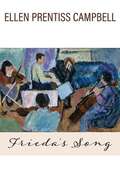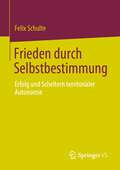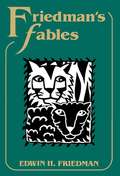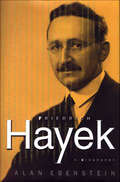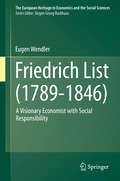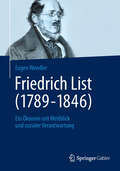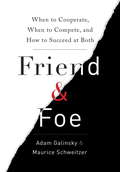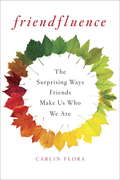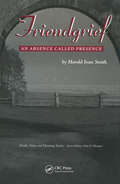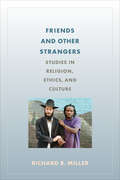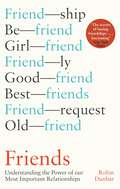- Table View
- List View
Freud: The Making of an Illusion
by Frederick CrewsFrom the master of Freud debunkers, the book that definitively puts an end to the myth of psychoanalysis and its creatorSince the 1970s, Sigmund Freud’s scientific reputation has been in an accelerating tailspin—but nonetheless the idea persists that some of his contributions were visionary discoveries of lasting value. Now, drawing on rarely consulted archives, Frederick Crews has assembled a great volume of evidence that reveals a surprising new Freud: a man who blundered tragicomically in his dealings with patients, who in fact never cured anyone, who promoted cocaine as a miracle drug capable of curing a wide range of diseases, and who advanced his career through falsifying case histories and betraying the mentors who had helped him to rise. The legend has persisted, Crews shows, thanks to Freud’s fictive self-invention as a master detective of the psyche, and later through a campaign of censorship and falsification conducted by his followers.A monumental biographical study and a slashing critique, Freud: The Making of an Illusion will stand as the last word on one of the most significant and contested figures of the twentieth century.
Freud: The Unconscious and World Affairs
by Rene Major Chantal TalagrandThis book sheds a new light on Freud who, from the beginning, was aware that the edifice he was constructing – psychoanalysis – which revealed in each individual an "ego not master in its own house" –, had clear implications for understanding collective human behaviour. This man was profoundly concerned with matters of peace and war, religion, morality and civilisation. The authors’ political focus is unusual, and their choice of quotes from lesser-known sources holds great interest. Freud’s interlocutors include Oskar Pfisrer, Swiss pastor and lay analyst; Einstein; and the American diplomat William Bullitt, with whom Freud wrote a study of President Wilson, entitled Thomas Widrow Wilson. A Psychological Study. In the Introduction to this book, written in 1930, Freud describes Wilson as a person for whom mere facts held no significance; he esteemed highly nothing but human motives and opinions.
Freudian Dictionary: A Comprehensive Guide to Freudian Concepts
by José VallsThe Freudian Dictionary provides a comprehensive and accessible guide to essential Freudian terms and concepts. Organized conceptually, the book is grounded in detailed and meticulous readings, and covers the full range of Freud’s writings and subjects. It also provides an overview of the development, vicissitudes, and syntheses of Freud’s unique lines of thought. Contemporary developments in psychoanalytic thought have aspired to surpass their Freudian origins. But this comprehensive guide to Freud’s work provides a touchstone for those wishing to clarify these roots, and the foundations of the discipline itself. It will be a valuable companion to psychoanalysts in practice and training across a range of schools, as well as a reference work for sociologists, artists, philosophers, historians and other scholars.
Freudian Passions: Psychoanalysis, Form and Literature
by Jan CampbellFreud's thinking about the unconscious has always been seen to be more about representations than affects. When it came to the passions of the transference and the demands of his hysterical patients, Freud was always more interested, wanted to move the focus away from the transference, and onto dreams. Hidden wishes more than manifest ones were what captured his imagination and style. This book returns to the repressed theory of passions in Freud's own thinking, arguing that the repression, fixation and rhythmic movement of affects make up the roots and branches of psychoanalytic thinking. We can think of Freud's unconscious affects as a tree, with the most passionate and primitive affects that make up the core of our psychic life, moving and branching out into more elaborated emotions and representations. So what moves this tree: the house of our first passions? How we move the tree of our affects, or leave it, is integral to Freud's understanding of sexuality and the Oedipal Complex.
Freudian Thought for the Contemporary Clinician: A Primer on Psychoanalytic Theory
by Robert MendelsohnThis book uses clear language, modern contexts and key psychoanalytic concepts to exemplify how Sigmund Freud’s thinking and legacy is directly relevant to contemporary therapists. Interweaving theory with history, Freudian Thought for the Contemporary Clinician allows readers to take a walk in Freud’s shoes, offering a new framework for understanding his arcane language and the cultural mores of the early 20th century. Robert Mendelsohn explores topics including sexuality and gender, racial injustice and cultural differences with direct reference to Freud’s cases, demonstrating how traditional psychoanalytic ideas may inform solutions to issues we face today. Featuring clinical examples and philosophical explorations delivered in an accessible style, Freudian Thought for the Contemporary Clinician will be a key text for psychoanalytic clinicians in practice and in training. It will also be of great interest to academics and scholars of psychoanalytic studies, the history of psychology and the history of ideas.
Freudian Unconscious and Cognitive Neuroscience: From Unconscious Fantasies to Neural Algorithms
by Vesa TalvitieThe aim of Freudian Unconscious and Cognitive Neuroscience is to create a conception of the "Freudian things" around the unconscious that takes seriously both the clinical data gathered in the scope of psychoanalytic clinical practice during the past 110 years, and the empirical and theoretical achievements of cognitive neuroscience and evolutionary theory. Tensions between the psychoanalytic and other views give a hint that the task is anything but easy.
Freudian repression, the Unconscious, and the Dynamics of Inhibition
by Simon BoagPossibly no other psychoanalytic concept has caused as much ongoing controversy, and attracted so much criticism, as that of 'repression'. Repression involves denying knowledge to oneself about the content of one's own mind and is most commonly implicated in disputes concerning the possibility of repressed memories of trauma (and their subsequent recovery). While fundamental in Freudian psychoanalysis, recent developments in psychoanalytic thinking (e.g., 'mentalization') have downplayed the importance of repression, in part due to less emphasis being placed on the importance of memory within therapy.
Freudianism
by I. R. Titunik Valentin Voloshinov Neal BrussFreudianism is a major icon in the history of ideas, independently rich and suggestive today both for psychoanalysis and for theories of language. It offers critical insights whose recognition demands a change in the manner in which the fundamental principles of both psychoanalysis and linguistic theory are understood. Volosinov went to the root of Freud's theory adn method, arguing that what is for him the central concept of psychoanalysis, "the unconscious," was a fiction. He argued that the phenomena that were taken by Freud as evidence for "the unconscious" constituted instead an aspect of "the conscious," albeit one with a person's "official conscious."For Volosinov, "the conscious" was a monologue, a use of language, "inner speech" as he called it. As such, the conscious participated in all of the properties of language, particularly, for Volosinov, its social essence. This type of argumentation stood behind Volosinov's charge that Freudianism presented humans in an inherently false, individualistic, asocial, and ahistorical setting.
Freud’s British Family: Reclaiming Lost Lives in Manchester and London (The History of Psychoanalysis Series)
by Roger WilloughbyFreud’s British Family presents ground-breaking research into the lives of the British branch of the Freud family, their connections to the founder of psychoanalysis, and into Freud’s relationship to Britain.Documenting the complex relationships the elder Freud brothers had with their much younger brother Sigmund, Freud’s British Family reveals the significant influence these hitherto largely forgotten Freuds had on the mental economy of the founder of psychoanalysis. Roger Willoughby shows how these key family relationships helped shape Freud’s thinking, attitudes, and theorising, including emerging ideas on rivalry, the Oedipus complex, character, and art. In addition to considering their correspondence and meetings with Freud in continental Europe, the book carefully documents Freud’s own visits to his brothers and to Britain in 1875 and again in 1908. Freud’s British Family concludes with a discussion of Freud’s final 15 months in London after he left Nazi Vienna as a refugee. Freud’s British Family offers a rich, contextualised understanding of the sibling, familial, and socio-cultural ties that went into forming the tapestry of psychoanalysis.Freud’s British Family will be of great interest to psychoanalysts and psychotherapists in practice and in training, and to scholars of the history of psychoanalysis, twentieth century history, psychosocial studies, and Jewish studies.
Freud’s Principal Case Studies Revisited: Freudian-Lacanian Psychoanalysts Reconsider the Legacy (The Freud Lacan institute Lectures series)
by Eve Watson Helena TexierFreud’s Principal Case Studies Revisited explores Freud’s six principal case studies studies – Dora, Little Hans, Schreber, the Wolf Man, the Rat Man and the Young Homosexual Girl – through the lens of contemporary psychoanalytic practice.Thirteen leading Freudian-Lacanian psychoanalysts reassess these cases in light of their significance to psychoanalytic theory and practice and consider their relevance in the twenty-first century. With new case material, theory, and analysis, the cases are critically re-invigorated and restored to a privileged place within psychoanalysis. Each of the cases is approached via a pairing of two psychoanalysts who engage with the clinical material, as well as with each other, in addressing their contributions to an assembled audience of clinicians, trainees and scholars. This book will be of great interest to psychoanalysts in practice and in training as well as psychologists, psychotherapists and psychiatrists. It will also be relevant for academics and students of psychoanalytic studies, philosophy, critical and cultural theory, social studies, critical psychology, gender and sexuality studies and queer theory.
Freundlichkeit im Schulalltag: Überlegungen zur Interaktionsgestaltung in der Schule (Psychologie in Bildung und Erziehung: Vom Wissen zum Handeln)
by Gisela SteinsWer im Lehrberuf ist, steht in einem lebhaften Austausch mit den heranwachsenden Generationen. Wenn auch relativ zu den Eltern in geringerem Ausmaß, beeinflussen auch Lehrer/-innen durch ihren häufigen und zeitintensiven Umgang in einem relativ geschlossenen Kontext systematisch die Vorstellungen von Heranwachsenden über sich selbst, andere Menschen und die Welt. Die Gestaltung dieser Zeit wird erheblich durch die Interaktionsgestaltung zwischen Lehrenden und Lernenden beeinflusst. In diesem Band wird das gegenwärtige, auf empirischer Evidenz beruhende Ideal einer Beziehungsgestaltung erarbeitet, in dem der Begriff der Zuwendung eine wichtige Grundlage bildet. Ziel des Bandes ist es, Anregungen zur Reflexion des eigenen Interaktionsstils zu geben. Dieser Band ist also ein etwas anderer, ungewöhnlicher Blick auf das Schüler/-innen/Lehrkraft/Verhältnis: der Freundlichkeit als grundlegendem Gestaltungsprinzip wird ein besonderer legitimer Platz eingeräumt.
Frida in America: The Creative Awakening of a Great Artist
by Celia StahrThe riveting story of how three years spent in the United States transformed the Mexican artist/painter Frida Kahlo (1907-1954) into the artist we know today. Frida Kahlo adored adventure. In November 1930, she was thrilled to realize her dream of traveling to the United States, where she would spend time in San Francisco, Detroit, and New York. Still, leaving her family and her country for the first time was monumental. Only twenty-three and newly married to the already world-famous and much older Diego Rivera, she was at a crossroads in her life. The United States, with its magnificent beauty, horrific poverty, racial tension, anti-Semitism, ethnic diversity, bland midwestern food, and thriving music scene, pushed Frida in unexpected directions. Shifts in her style of painting began to appear, cracks in her marriage widened, and tragedy struck, twice, while she was living in Detroit. Frida in America is the first in-depth biography of these formative years spent in “Gringolandia,” a place that both fascinated and angered Frida. However, it was precisely her feelings of being a stranger in a strange land that fueled her creative passions and an even stronger sense of Mexican identity. With vivid detail, Frida in America re-creates the pivotal journey that turned Senora Rivera into the world-famous Frida Kahlo. CELIA STAHR is a professor at the University of San Francisco, where she specializes in modern American and contemporary art with an emphasis on feminist art and gender studies, as well as African and multicultural art. She holds a PhD in Art History from the University of Iowa and lives in the Bay Area.
Fried: Why You Burn Out And How To Revive
by Joan BorysenkoThis Is an Invitation to Take Your Power Back! What happened to the spark you had as a child that powered curiosity, engagement with life, and creativity? Has it burned out? Are you feeling emotionally and physically exhausted and cynical, wondering if you’ve got what it takes to make it in this rapidly changing world? Burnout looks a lot like depression, but it’s not a biological bogeyman that medication or simple stress management can cure. It’s a disorder of hope and will that sucks the life out of competent, idealistic, hardworking people like you; and it will be an ongoing challenge for you to take your power back! In this breakthrough work, Joan Borysenko, Ph.D.—a Harvard-trained medical scientist, psychologist, and renowned pioneer in stress and health—straddles psychology, biology, and soul in a completely fresh approach to burnout. Joan’s deeply human (and often amusing) personal accounts of burnout and recovery; the science of helplessness, hopelessness, and empowerment; and the rich wisdom of people who have gone from fried to revived—including many of Joan’s vibrant community of 5,000 Facebook Friends—make this powerful and practical book a must-read for our times.
Frieda's Song: A Novel
by Ellen Prentiss CampbellThis novel tells two interlocking stories: the story of psychoanalyst Frieda Fromm-Reichmann, who treated the young woman made famous in the novel I Never Promised You a Rose Garden; and Eliza Kline, a social worker who lives in Frieda's cottage seventy years later. Frieda struggles to adapt to life in the US while Hitler ravages her native Austria, and Eliza worries about her teenage son, who seems increasingly angry and alienated. As Eliza struggles to communicate with Nick, Frieda becomes her mentor and confidante in absentia.
Frieden durch Selbstbestimmung: Erfolg und Scheitern territorialer Autonomie
by Felix SchulteSeit Ende des Kalten Krieges wurden in mehr als 200 Friedensverträgen Autonomieabkommen vereinbart. Während manche Autonomielösungen ethnische Selbstbestimmungskonflikte erfolgreich regulieren konnten, sind andere gescheitert. Wann also funktioniert Autonomie? Dieses Buch verbindet Ansätze aus der Politikwissenschaft, der Konfliktforschung und der Sozialpsychologie und entwickelt eine neue Theorie zur Erklärung von Autonomieerfolg und -scheitern. Diese beschreibt einen initiierten Prozess der ethnischen Anerkennung als Grundlage für ein friedliches Zusammenleben in multiethnischen Post-Konfliktgesellschaften. Während territoriale Autonomiearrangements hierfür einen geeigneten institutionellen Rahmen bieten, ist dieser Anerkennungsprozess stark kontextabhängig. Die Studie identifiziert hierfür kausal relevante Faktoren und analysiert deren Auftreten in den Konsolidierungsphasen von 19 Autonomien weltweit mittels Qualitative Comparative Analysis (QCA) und theorietestenden Prozessanalysen. Die Studie zeigt, dass Autonomieerfolg in der Tat von einer spezifischen Kombination von strukturellen und akteurszentrierten Erfolgsfaktoren abhängt. Ethnische Eliten akzeptieren Autonomiereformen, wenn diese ein hohes Maß an Selbstbestimmung mit sich bringen und gleichzeitig der Anerkennungsprozess nicht durch ausgeprägte Ungleichheiten behindert wird. Elitenkooperationen gelingen in demokratisch-inklusiven Institutionen und mit internationaler Unterstützung und senden entscheidende Signale für gesellschaftliche Annäherung. Autonomiereformen scheitern, wenn der Grad an gewährter Selbstbestimmung zu gering ist und horizontale Ungleichheiten zu neuen Grievances führen. In Kombination mit exklusiven Institutionen und mangelnder internationaler Aufmerksamkeit führt dies zu weiterer Eskalation.
Friedman's Fables
by Edwin H. FriedmanDr. Friedman has woven 24 illustrative tales that offer fresh perspectives on familiar human foibles and reflect the author's humor, pathos, and understanding. Friedman takes on resistance and other "demons" to show that neither insight, nor encouragement, nor intimidation can in themselves motivate an unmotivated person to change. These tales playfully demonstrate that new ideas, new questions, and imagination, more than accepted wisdom, provide each of us with the keys to overcoming stubborn emotional barriers and facilitating real change both in ourselves and others. Thought-provoking discussion questions for each fable are included.
Friedman's Fables (with Booklet)
by Edwin H. FriedmanDr. Friedman has woven 24 illustrative tales that offer fresh perspectives on familiar human foibles and reflect the author's humor, pathos, and understanding. Friedman takes on resistance and other "demons" to show that neither insight, nor encouragement, nor intimidation can in themselves motivate an unmotivated person to change. These provocative tales playfully demonstrate that new ideas, new questions, and imagination, more than accepted wisdom, provide each of us with the keys to overcoming stubborn emotional barriers and facilitating real change both in ourselves and others. Sure to intrigue and inform, this book belongs in the resource library of public speakers, teachers, trainers, and clergy, as well as general readers.
Friedrich Hayek: A Biography
by Alan EbensteinThis biography tells the story of one of the most important public figures of the twentieth century, Friedrich Hayek.Here is the first full biography of Friedrich Hayek, the Austrian economist who became, over the course of a remarkable career, the great philosopher of liberty in our time. In this richly detailed portrait, Alan Ebenstein chronicles the life, works, and legacy of a visionary thinker, from Hayek's early years as the scholarly son of a physician in fin-de-siecle Vienna on an increasingly wider world as an economist and political philosopher in London, New York, and Chicago.Ebenstein gives a balanced, integrated account of Hayek's extraordinary diverse body of work, from his fist encounter with the free market ideas of mentor Ludwig Von Mises to his magisterial writings in later life on the legal, political, ethical, and economic requirements of a free society. Awarded the Nobel Prize in 1974, Hayek's vision of a renewed classical liberalism-of free markets and free ideas in free societies-has taken hold in much of the world.Alan Ebenstein's clearly written account is an essential starting point for anyone seeking to understand why Hayek's ideas have become the guiding force of our time. His illuminating portrait of Hayek the man brings to new life the spirit of a great scholar and tenacious advocate who has become, in Peter Drucker's words, "our time's preeminent social philosopher."
Friedrich List (1789-1846)
by Eugen WendlerFriedrich List (1789-1846) was a prophet of social market economy, national economy and the infant-industry theory. In this comprehensive biography the international influence and reception of List's theories is presented together with his extraordinary vita List was a notable early advocate of economic integration of the many separate states of 19th century Germany. His basic theory is that of productive resources and the need to protect infant industries until they have matured enough to stand alone. He is recognized as a visionary economist with social responsibility and as an influential railway pioneer. He was a liberal and a democrat who promoted an extended representative democracy, including respect for human rights and civil liberties, to accompany industrial development His highly influential main work "The National System of Political Economy" has been translated into many languages. Eugen Wendler, the renowned author and List expert, not only builds upon his many years of research, but also discusses several new sources. This richly illustrated book is as informative as it is well written.
Friedrich List (1789-1846)
by Eugen WendlerIn dieser ebenso unterhaltsamen wie informativen Biografie wird die Wirkungs- und Rezeptionsgeschichte der Theorien von Friedrich List auf der Basis seines außergewöhnlichen Lebenslaufes dargestellt. Der renommierte und mehrfach für seine Forschung ausgezeichnete List-Experte Eugen Wendler fasst hier die Ergebnisse seiner langjährigen Forschungsarbeit zusammen und ergänzt sie durch neueste Erkenntnisse und Quellen. So ist ein umfassendes und werthaltiges Werk entstanden, das zudem zahlreiche bislang noch unbekannte Abbildungen enthält.
Friend & Foe: When to Cooperate, When to Compete, and How to Succeed at Both
by Adam Galinsky Maurice SchweitzerWhat does it take to succeed? This question has fueled a long-running debate. Some have argued that humans are fundamentally competitive, and that pursuing self-interest is the best way to get ahead. Others claim that humans are born to cooperate and that we are most successful when we collaborate with others. In FRIEND AND FOE, researchers Galinsky and Schweitzer explain why this debate misses the mark. Rather than being hardwired to compete or cooperate, we have evolved to do both. In every relationship, from co-workers to friends to spouses to siblings we are both friends and foes. It is only by learning how to strike the right balance between these two forces that we can improve our long-term relationships and get more of what we want.Here, Galinsky and Schweitzer draw on original, cutting edge research from their own labs and from across the social sciences as well as vivid real-world examples to show how to maximize success in work and in life by deftly navigating the tension between cooperation and competition. They offer insights and advice ranging from: how to gain power and keep it, how to build trust and repair trust once it's broken, how to diffuse workplace conflict and bias, how to find the right comparisons to motivate us and make us happier, and how to succeed in negotiations - ensuring that we achieve our own goals and satisfy those of our counterparts.Along the way, they pose and offer surprising answers to a number of perplexing puzzles: when does too much talent undermine success; why can acting less competently gain you status and authority, where do many gender differences in the workplace really come from, how can you use deception to build trust, and why do you want to go last on American Idol and in many interview situations, but make the first offer when negotiating the sale of a new car.We perform at our very best when we hold cooperation and competition in the right balance. This book is a guide for navigating our social and professional worlds by learning when to cooperate as a friend and when to compete as a foe--and how to be better at both.
Friendfluence: The Surprising Ways Friends Make Us Who We Are
by Carlin FloraDiscover the unexpected ways friends influence our personalities, choices, emotions, and even physical health in this fun and compelling examination of friendship, based on the latest scientific research and ever-relatable anecdotes.Why is dinner with friends often more laughter filled and less fraught than a meal with family? Although some say it's because we choose our friends, it's also because we expect less of them than we do of relatives. While we're busy scrutinizing our romantic relationships and family dramas, our friends are quietly but strongly influencing everything from the articles we read to our weight fluctuations, from our sex lives to our overall happiness levels.Evolutionary psychologists have long theorized that friendship has roots in our early dependence on others for survival. These days, we still cherish friends but tend to undervalue their role in our lives. However, the skills one needs to make good friends are among the very skills that lead to success in life, and scientific research has recently exploded with insights about the meaningful and enduring ways friendships influence us. With people marrying later--and often not at all--and more families having just one child, these relationships may be gaining in importance. The evidence even suggests that at times friends have a greater hand in our development and well-being than do our romantic partners and relatives.Friends see each other through the process of growing up, shape each other's interests and outlooks, and, painful though it may be, expose each other's rough edges. Childhood and adolescence, in particular, are marked by the need to create distance between oneself and one's parents while forging a unique identity within a group of peers, but friends continue to influence us, in ways big and small, straight through old age.Perpetually busy parents who turn to friends--for intellectual stimulation, emotional support, and a good dose of merriment--find a perfect outlet to relieve the pressures of raising children. In the office setting, talking to a friend for just a few minutes can temporarily boost one's memory. While we romanticize the idea of the lone genius, friendship often spurs creativity in the arts and sciences. And in recent studies, having close friends was found to reduce a person's risk of death from breast cancer and coronary disease, while having a spouse was not.Friendfluence surveys online-only pals, friend breakups, the power of social networks, envy, peer pressure, the dark side of amicable ties, and many other varieties of friendship. Told with warmth, scientific rigor, and a dash of humor, Friendfluence not only illuminates and interprets the science but draws on clinical psychology and philosophy to help readers evaluate and navigate their own important friendships.
Friendgrief: An Absence Called Presence (Death, Value and Meaning Series)
by Harold Ivan SmithThis book not only examines friendgrief from a theoretical and clinical framework, but also Smith offers fascinating vignettes from the lives of well-known friendgrievers such as Elton John, Diane Sawyer, Ralph Abernathy, C. S. Lewis, Harry Truman, Tommy Lasorda, Jimmy Carter, Fritz Mondale, Bill Clinton, Calvin Trillin, and Alan King. The author includes moving narratives of numerous individuals who have never gained notoriety but have become seasoned friendgrievers.
Friends and Other Strangers: Studies in Religion, Ethics, and Culture
by Richard MillerFriends and Other Strangers argues for expanding the field of religious ethics to address the normative dimensions of culture, interpersonal desires, friendships and family, and institutional and political relationships. Richard B. Miller urges religious ethicists to turn to cultural studies to broaden the range of the issues they address and to examine matters of cultural practice and cultural difference in critical and self-reflexive ways. Friends and Other Strangers critically discusses the ethics of ethnography; ethnocentrism, relativism, and moral criticism; empathy and the ethics of self-other attunement; indignation, empathy, and solidarity; the meaning of moral responsibility in relation to children and friends; civic virtue, war, and alterity; the normative and psychological dimensions of memory; and religion and democratic public life. Miller challenges distinctions between psyche and culture, self and other, and uses the concepts of intimacy and alterity as dialectical touchstones for examining the normative dimensions of self-other relationships. A wholly contemporary, global, and interdisciplinary work, Friends and Other Strangers illuminates aspects of moral life ethicists have otherwise overlooked.
Friends: Understanding the Power of our Most Important Relationships
by Robin Dunbar'Fascinating...In essence, the number and quality of our friendships may have a bigger influence on our happiness, health and mortality risk than anything else in life save for giving up smoking' Guardian, Book of the DayFriends matter to us, and they matter more than we think. The single most surprising fact to emerge out of the medical literature over the last decade or so has been that the number and quality of the friendships we have has a bigger influence on our happiness, health and even mortality risk than anything else except giving up smoking.Robin Dunbar is the world-renowned psychologist and author who famously discovered Dunbar's number: how our capacity for friendship is limited to around 150 people. In Friends, he looks at friendship in the round, at the way different types of friendship and family relationships intersect, or at the complex of psychological and behavioural mechanisms that underpin friendships and make them possible - and just how complicated the business of making and keeping friends actually is.Mixing insights from scientific research with first person experiences and culture, Friends explores and integrates knowledge from disciplines ranging from psychology and anthropology to neuroscience and genetics in a single magical weave that allows us to peer into the incredible complexity of the social world in which we are all so deeply embedded.Working at the coalface of the subject at both research and personal levels, Robin Dunbar has written the definitive book on how and why we are friends.
